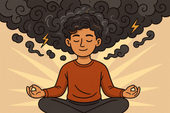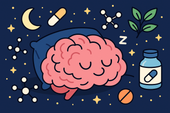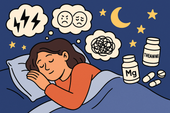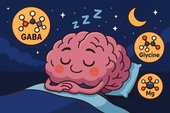Emergency Toolkit: Breathwork + Supplements for Emotional Crises
Introduction ⚡
For people living with Borderline Personality Disorder (BPD), emotional crises can strike like a storm—sudden, overwhelming, and consuming. Whether triggered by rejection, conflict, or even subtle stressors, these episodes can lead to spirals of panic, rage, despair, or dissociation. In the heat of the moment, it often feels impossible to think clearly or remember coping skills.
This is where an emergency toolkit becomes essential. Unlike long-term self-care rituals, an emergency toolkit is a set of fast-acting tools you can turn to in the middle of an emotional crisis. Two of the most powerful components are:
Breathwork 🌬️: immediate regulation of the nervous system.
Supplements 💊: targeted nutrients that quickly reduce stress and calm the body.
By combining these with therapy-informed strategies, you can move through crises with less chaos and more control.
Looking for supplements for people with BPD? Click here.
Why Emotional Crises Feel So Intense in BPD 🌪️

The Biology of a Crisis
During emotional overwhelm, the body’s fight-flight-freeze system activates. For people with BPD, this activation is often stronger and harder to turn off:
Cortisol surges, raising stress.
Adrenaline fuels panic and impulsivity.
Inflammation increases, worsening mood instability.
Prefrontal cortex (rational thinking) goes offline.
The result? You feel hijacked by your emotions.
Why a Toolkit Helps
A crisis toolkit works by:
Interrupting the spiral (with breathwork).
Providing fast-acting biological support (with supplements).
Re-engaging therapy skills (with DBT, CBT, or grounding).
Breathwork for Emotional Crises 🌬️
Breathwork is the fastest way to influence the nervous system. Different techniques work for different crisis states:
Box Breathing 🟦
Inhale 4 → Hold 4 → Exhale 4 → Hold 4
Slows racing thoughts.
Restores a sense of structure when emotions feel chaotic.
Useful in panic, rage, or overwhelm.
4-7-8 Breathing 🌙
Inhale 4 → Hold 7 → Exhale 8
Induces deep relaxation.
Best for calming anxiety or preventing escalation.
Coherent Breathing 🌊
Inhale 5–6 sec → Exhale 5–6 sec
Balances nervous system.
Improves heart rate variability.
Great for post-crisis stabilization.
Grounding Breath 🌍
Focus on exhaling longer than inhaling.
Say silently: “I am safe. This will pass.”
Helps with dissociation or emotional numbness.
Humming Breath 🎶
Exhale with a gentle hum.
Stimulates the vagus nerve.
Brings calm during spirals of anger or fear.
Want to try Breathwork? Click Here.
Supplements for Emotional Crises 💊
Some supplements act quickly, supporting the nervous system during high-stress moments.
Magnesium 🌌
Supports GABA activity → calming neurotransmitter.
Relieves muscle tension and panic.
Best form: magnesium glycinate or bisglycinate.
👉 Crisis Use: 200–300 mg with water.
L-Theanine 🍵
Found in green tea.
Increases alpha brain waves → calm focus.
Reduces hyperarousal without sedation.
👉 Crisis Use: 200 mg capsule or calming tea.
Ashwagandha 🌱
Adaptogen that lowers cortisol.
Helps calm overwhelming stress response.
Can reduce irritability and anxiety.
👉 Crisis Use: 300–600 mg (not immediate, but helpful if taken consistently).
Glycine 🌙
Amino acid that promotes relaxation.
Lowers body temperature → induces calm.
Useful at night during crisis-related insomnia.
👉 Crisis Use: 3 grams powder or capsules.
Omega-3 Fatty Acids 🐟
Anti-inflammatory, supports brain stability.
Not instant, but helps reduce baseline reactivity.
👉 Crisis Use: Take daily; not a fast fix, but prevents escalation.
Probiotics & Prebiotics 🦠
Improve gut-brain axis.
Support resilience over time.
👉 Crisis Use: Long-term support, not immediate.
Rescue Options 🌟
Some natural remedies offer quick relief:
Passionflower 🌸: reduces acute anxiety.
Valerian root 🌿: calming, but can cause drowsiness.
Chamomile tea 🍵: gentle relaxation.
⚠️ Important: Supplements are supportive tools, not replacements for professional care. Always consult with a doctor, especially if taking medications.
Looking for supplements for people with BPD? Click here.
Therapy Tools for Crisis Integration 🛋️

While breathwork and supplements calm the body, therapy tools give structure to the mind.
DBT Skills 💬
TIP skill: Temperature, Intense exercise, Paced breathing, Progressive muscle relaxation.
STOP skill: Stop → Take a step back → Observe → Proceed mindfully.
CBT Tools 🧠
Identify crisis-driven thoughts (“I can’t handle this”).
Reframe (“This will pass. I’ve survived this before”).
Grounding Skills 🌍
5-4-3-2-1 method: Name 5 things you see, 4 feel, 3 hear, 2 smell, 1 taste.
Hold an ice cube to anchor in the present.
Looking for online therapy for people with BPD? Click Here.
A Step-by-Step Crisis Toolkit ⚡
Here’s how to combine breathwork + supplements + therapy skills during a crisis:
Step 1: Pause & Breathe 🌬️
Use Box Breathing for 2 minutes.
Step 2: Supplement Support 💊
Take magnesium or L-theanine.
Sip chamomile tea if available.
Step 3: Grounding & Reflection 🌍
Use DBT STOP skill.
Journal one sentence about what you feel.
Step 4: Gentle Breathwork 🌙
Switch to 4-7-8 or Coherent Breathing.
Step 5: Post-Crisis Integration 🛋️
Reflect on triggers in a therapy journal.
Practice self-compassion: “I survived. I am safe.”
A Daily Routine to Prevent Crises 🌞🌙
Preventing crises is just as important as surviving them.
Morning 🌞
Supplements: Omega-3, Vitamin D, Probiotic.
5 minutes Coherent Breathing.
Afternoon 🌿
L-Theanine for focus.
Box Breathing if triggered.
Evening 🌙
Magnesium + Ashwagandha.
4-7-8 Breathing.
Journaling for therapy reflection.
Case Studies 👩👨
Case 1: Anna 🌸
Experienced panic attacks daily.
Added magnesium + Box Breathing.
Learned to de-escalate within minutes.
Case 2: Daniel ⚡
Struggled with anger crises in relationships.
Used L-Theanine + Humming Breath.
Reported calmer responses and less regret.
Case 3: Maria 🌙
Battled dissociation and insomnia.
Used Glycine + 4-7-8 Breathing.
Slept more deeply, reduced emotional numbness.
Challenges & Tips ⚠️
Forgetting tools in crisis: Keep a written list in your bag or phone.
Overreliance on supplements: Use them as support, not avoidance.
Triggers from breathwork: If breathwork feels overwhelming, start gently with Coherent Breathing.
Consistency: Practice daily rituals so tools feel natural in crisis.
Long-Term Benefits 🌈
With regular use, a breathwork + supplement crisis toolkit helps you:
Shorten the length of emotional crises.
Reduce intensity of panic and rage.
Improve sleep quality.
Strengthen therapy outcomes.
Build resilience and self-trust. 💜
Conclusion 💜
Emotional crises with BPD can feel terrifying—but you are not powerless. With an emergency toolkit built on breathwork + supplements + therapy skills, you can interrupt spirals, calm your nervous system, and move through crises with greater control.
Breathwork: Immediate nervous system regulation.
Supplements: Biological support for calm and recovery.
Therapy tools: Structure and meaning in the chaos.
Together, they create a safety net—one that helps you not just survive emotional crises, but build strength, resilience, and hope. 🌬️🌿✨
References 📚
Linehan, M. M. (2014). DBT Skills Training Manual. Guilford Press.
Porges, S. W. (2011). The Polyvagal Theory. Norton.
Shapiro, F. (2018). EMDR Therapy. Guilford Press.
Murao, E., & Shimizu, E. (2021). “Magnesium in psychiatric disorders.” Nutrients.
Parker, G., et al. (2015). “Omega-3 supplementation and borderline personality disorder.” Psychiatry Research.
Jerath, R., et al. (2015). “Physiology of long pranayamic breathing.” Medical Hypotheses.
Neff, K. (2011). Self-Compassion. HarperCollins.
Related Posts
-

How to Measure Your Emotional Growth Over Time
Emotional growth can’t be measured on a scale — but it can be tracked through awareness, regulation, and reflection. Learn how to monitor your emotional evolution using journaling, biofeedback, and science-backed metrics for real progress. 💫
-

The Connection Between Creativity and Resilience
Creativity and resilience share the same roots — adaptability, flexibility, and imagination. Learn how creative expression rewires your brain for strength, helping you transform stress into growth through neuroscience, art, and self-reflection. 🌿
-

Why Cycling Supplements May Improve Long-Term Resilience
Your body adapts to everything — even supplements. Discover why cycling your supplements helps prevent tolerance, boost energy naturally, and build lasting resilience by aligning with your body’s biological rhythms. 🌿
-

The Role of Biofeedback in Emotional Strength
Learn how biofeedback bridges mind and body — helping you monitor heart rate, breath, and brain activity to build emotional strength, resilience, and calm under pressure. See how science meets mindfulness for lasting control. 🌿
-

How to Stay Strong During Long-Term Stress
Long-term stress doesn’t just drain your energy — it rewires your biology. Discover science-backed ways to strengthen your body, balance your mind, and build lasting resilience through breathwork, nutrition, mindset shifts, and supplements that restore calm and focus. 💪
-

Resilience Training for Entrepreneurs
Entrepreneurship isn’t just about strategy — it’s about stamina. Discover how resilience training helps founders stay calm, clear-headed, and adaptable under pressure through neuroscience-backed habits, emotional regulation, and smart supplementation. 🌿
-

How Nootropics Can Boost Emotional Control
Emotions don’t have to control you. Discover how nootropics like L-theanine, ashwagandha, saffron, and omega-3s help balance brain chemistry, improve focus, and strengthen your ability to stay calm and composed under stress. 🌿
-

Stacking Adaptogens for Maximum Resilience
Adaptogens are nature’s stress shield — helping you stay calm, energized, and clear even under pressure. Learn how to stack herbs like ashwagandha, rhodiola, reishi, and schisandra for maximum resilience, balance, and long-term vitality. 🌿
-

Post-Traumatic Growth and Supplements That Support It
After trauma, true healing means more than survival — it’s transformation. Learn how post-traumatic growth happens in the brain and body, and explore natural supplements like magnesium, ashwagandha, saffron, and omega-3s that support resilience, clarity, and emotional repair.
-

How to Regain Focus After Emotional Stress
After emotional stress, your nervous system feels frayed — your focus fades, thoughts race, and calm seems impossible. Learn how to restore balance, rebuild concentration, and retrain your brain for clarity and peace through evidence-based mind–body tools. 🌿
-

The Future of Sleep Supplements
The future of sleep supplements is here — where science meets nature. Discover how next-generation formulas use adaptogens, amino acids, and biotech innovations to support deep, restorative sleep without dependency. 🌙
-

Emerging Research on Sleep and Nootropics
Can nootropics help you sleep better? Discover how compounds like L-theanine, magnesium threonate, ashwagandha, and Alpha-GPC influence neurotransmitters, circadian rhythm, and brain recovery — bridging the gap between smarter days and deeper nights. 🌙
-

New Herbal Extracts for Deep Sleep
Discover the next generation of herbal extracts for deep sleep — from saffron and magnolia to jujube and lemon balm. Learn how these plant-based compounds calm the nervous system, balance cortisol, and promote truly restorative rest. 🌙
-

Sleep Biohacking: What Works and What Doesn’t
Biohacking your sleep can sound futuristic — from red light therapy to wearables and supplement stacks. But which hacks actually help, and which are just hype? Discover the science-backed sleep strategies that truly improve rest, recovery, and brain health. 🌙
-

Sleep Support for People with Anxiety Disorders
💭 A restless mind can keep you up all night — thoughts spinning, heart racing, and peace feeling far away. Learn how to quiet overthinking, regulate your nervous system, and create a nightly ritual that teaches your brain to let go and rest deeply. 🌙
-

How to Fall Back Asleep After Waking Up
Waking up in the middle of the night? Learn how to fall back asleep quickly and calmly using breathing techniques, stress-reducing rituals, and natural supplements like magnesium and glycine. Restore your body’s rhythm and wake up feeling refreshed.
-

The Role of Omega-3s in Sleep Quality
-

Stacking GABA and Glycine for Deeper Rest
Discover how stacking GABA and glycine can help you achieve deeper, more restorative sleep. Learn how these calming amino acids work together to relax your mind, soothe your body, and improve overall sleep quality—naturally and safely.
-

Overcoming Jet Lag with Supplements
✈️ Jet lag doesn’t have to ruin your trip! Discover how supplements like melatonin, magnesium, L-theanine, and tart cherry can help you reset your body clock faster, reduce fatigue, and recover energy naturally after long flights. 🌙
-

Managing Sleep During Times of Stress
Feeling wired and restless? Learn how to manage sleep during stressful times through nutrition, breathwork, and natural supplements like magnesium and L-theanine. Discover how to calm your nervous system and restore deep, peaceful rest—even when life feels overwhelming.
-

The Role of Magnesium for Night Cramps
Night cramps keeping you awake? Discover how magnesium helps relax muscles, balance electrolytes, and prevent painful spasms. Learn which forms work best, how to take them, and how to pair them with other nutrients for cramp-free, peaceful sleep.
-

Supplements That Reduce Nighttime Awakenings
🌙 Discover science-backed supplements that help you stay asleep through the night. From magnesium and L-theanine to glycine and ashwagandha, learn how these natural compounds calm your nervous system, balance cortisol, and prevent 2 a.m. wake-ups for deeper, more restorative rest.
-

Nootropics That Promote Calm and Rest
Explore the world of calming nootropics — natural brain enhancers that promote relaxation, better focus, and deeper rest. Learn how L-Theanine, magnesium, ashwagandha, and other adaptogens help balance your nervous system, reduce stress, and support restorative sleep.
-

Best Natural Supplement Stack for Sleep
Discover the best natural supplement stack for deep, restorative sleep. Learn how nutrients like magnesium, L-theanine, glycine, and calming herbs such as chamomile and ashwagandha work together to relax your body, calm your mind, and improve sleep quality—naturally and safely.
-

Combining L-Theanine and Magnesium for Sleep: A Calm Night, Naturally
Discover how combining L-Theanine and Magnesium can help you drift into deep, restorative sleep. Learn how this natural duo calms the mind, relaxes the body, and supports your nervous system—without grogginess the next morning.
-

How to Sleep Better After Intense Workouts
Struggling to fall asleep after a tough workout? Learn how to optimize your post-training recovery with nutrition, hydration, and science-backed sleep strategies. Discover how to calm your nervous system, balance hormones, and wake up fully recharged for your next session.
-

Ashwagandha and Valerian: A Bedtime Combo for Deep Rest and Emotional Reset
Discover the calming synergy of Ashwagandha and Valerian root, two natural sleep aids that help quiet the mind, ease anxiety, and promote deeper rest. Learn how this herbal duo supports the nervous system, balances stress hormones, and restores emotional peace — without next-day grogginess.
-

How to Create a Resilience-Boosting Diet
Discover how to build emotional and physical strength from the inside out with a resilience-boosting diet 🍎. Learn which foods stabilize your mood, how supplements like magnesium and omega-3s strengthen your stress response, and why pairing nutrition with breathwork and therapy creates lasting calm, focus, and vitality 🌿💪.
-

Best Teas and Herbal Blends for Calmness: Nature’s Way to Restore Inner Peace
Ashwagandha, the ancient adaptogenic herb, helps your body find balance during stress. Known as “Indian ginseng,” it supports cortisol regulation, boosts energy, and restores calm clarity. Discover how this powerful root promotes resilience, emotional balance, and steady vitality — one cup at a time. 🌸
-

Parenting and Emotional Strength: How to Raise Children Without Losing Yourself
Empathy is the bridge that connects hearts — the quiet power to understand, feel, and support another’s emotions without judgment. Learn how empathy strengthens relationships, enhances communication, and cultivates deeper compassion in everyday life. 🌿
-

How to Bounce Back from Public Failure: Reclaiming Confidence, Purpose, and Power
Visualization is more than imagination — it’s brain training for resilience. By picturing calm, success, or healing, you activate the same neural pathways as real experience. Learn how daily visualization rewires your brain for confidence, emotional balance, and recovery from stress. ✨
-

Coping with Financial Stress Through Resilience: How to Stay Grounded When Money Feels Tight
Body awareness is the foundation of emotional resilience. By tuning into your body’s signals — tension, fatigue, or calm — you learn to recognize stress before it overwhelms you. Discover how mindfulness, gentle movement, and breathwork can deepen your connection with your body and restore balance from the inside out. 🧘
-

How to Stay Positive During Chronic Illness: A Guide to Emotional Strength and Hope
Creativity is more than art — it’s a form of healing. Whether through painting, writing, music, or small acts of expression, creativity helps release emotion, calm the nervous system, and reconnect you to joy. Discover how to use creativity as a tool for emotional balance, resilience, and self-discovery. 🌿
-

Resilience Tips for Caregivers: How to Stay Strong While Caring for Others
Joy isn’t the absence of pain — it’s the quiet strength to find light even in challenging times. Cultivating joy through small daily moments restores balance, releases stress, and reminds you of life’s beauty. Learn how to reconnect with authentic happiness, rebuild emotional energy, and nurture your nervous system through gratitude, presence, and play. 🌿
-

Building Resilience After a Breakup: How to Heal, Rebuild, and Rise Stronger
Social connection is one of the strongest predictors of emotional resilience. During difficult times, genuine relationships act as anchors — calming the nervous system, reducing stress hormones, and helping you regain perspective. Learn how cultivating real human connection can strengthen your mind, heart, and overall well-being. 🌿
-

How to Stay Emotionally Strong During Job Loss
Your emotions are powered by brain chemistry — a delicate balance of neurotransmitters like serotonin, dopamine, and cortisol. When these chemicals work in harmony, you feel calm, focused, and resilient. Learn how daily habits, nutrition, and mindfulness can support your brain chemistry and boost emotional well-being naturally. 🌿
-

The Role of Hormones in Emotional Stability: How Your Chemistry Shapes Your Calm
Hormones shape more than your body — they shape your emotions, resilience, and sense of calm. From cortisol to serotonin, these chemical messengers influence how you react to stress, connect with others, and recover from challenges. Learn how to balance your hormones naturally to build lasting emotional stability and harmony within. 💫
-

Mitochondria and Emotional Energy: The Cellular Power Behind Your Mood
Breathwork is one of the most powerful tools for emotional regulation and cellular balance. Through intentional breathing, you can calm your nervous system, increase oxygen flow to the brain, and even support mitochondrial energy. Learn how conscious breathing connects body and mind — transforming stress into presence and emotional strength. 🌿
-

Inflammation and Its Impact on Mood Resilience: The Silent Link Between Body and Mind
Inflammation doesn’t just affect the body — it impacts the mind. Chronic inflammation alters brain chemistry, depletes serotonin, and makes emotional recovery harder. Learn how calming inflammation through nutrition, mindfulness, and sleep can restore balance, resilience, and a renewed sense of emotional strength. 💫
-

How Antioxidants Protect Emotional Well-being: The Hidden Link Between Oxidative Stress and Mental Health
Antioxidants do more than protect your body — they defend your mind. By neutralizing oxidative stress, antioxidants support serotonin, dopamine, and brain energy pathways that keep you calm, focused, and emotionally balanced. Discover how foods like berries, green tea, and dark chocolate nourish your brain, boost mood, and strengthen resilience from the inside out. 🌿✨
-

The HPA Axis and Emotional Health: The Hidden Bridge Between Stress and Mind
Neuroplasticity — the brain’s ability to rewire and adapt — is the foundation of emotional healing and resilience. When you face stress, trauma, or change, your neural pathways can reshape themselves to support new patterns of calm, focus, and self-awareness. Learn how daily practices like mindfulness, therapy, and breathwork strengthen neuroplasticity to transform emotional pain into personal growth. 🌸
-

Why Cortisol Control Is Key to Resilience: Mastering Stress to Build Emotional Strength
Controlling cortisol — the body’s main stress hormone — is the secret to lasting resilience. When cortisol levels stay balanced, your mind becomes clearer, emotions steadier, and energy more sustainable. Learn how breathwork, mindset shifts, adaptogens, and daily rhythms can help you calm your stress response and build true inner strength. 🌞💪
-

Dopamine’s Influence on Motivation and Recovery: Reigniting Drive and Balance
Healthy relationships are the foundation of emotional balance and resilience. Whether romantic, familial, or platonic, genuine connection releases dopamine, serotonin, and oxytocin — the brain’s “bonding trio” — helping us feel secure, motivated, and seen. Learn how trust, empathy, and communication not only strengthen your connections but also reshape your nervous system for deeper emotional well-being. 🌿🤝
-

The Role of Serotonin in Resilience: How This “Mood Molecule” Shapes Emotional Strength
Serotonin — often called the “resilience molecule” — plays a vital role in how we handle stress, regulate mood, and recover from emotional challenges. Beyond happiness, this powerful neurotransmitter helps balance the gut-brain axis, stabilize the nervous system, and support emotional flexibility. Learn how nutrition, sunlight, mindfulness, and adaptogens can naturally boost serotonin and strengthen your emotional resilience. 🌞🧠
-

How Neuroplasticity Supports Emotional Growth: Rewiring the Brain for Resilience
Neuroplasticity is the brain’s built-in power to grow, adapt, and heal — and it’s the foundation of emotional transformation. Every mindful breath, compassionate act, or reframed thought strengthens new neural pathways that support resilience and self-awareness. Learn how your brain rewires through daily habits, helping you turn emotional challenges into opportunities for growth and calm. 🌿
-

Tai Chi and Adaptogens for Mind-Body Balance: The Art of Harmonizing Energy and Resilience
Alchemy isn’t just an ancient science — it’s a timeless symbol of transformation and inner balance. By blending the physical and spiritual, alchemy teaches us that change begins from within. Just as metals are refined into gold, we too can transmute emotional pain, stress, and chaos into clarity and strength through mindful practice and self-awareness. 🌙✨
-

Cold Therapy and Emotional Control: Training the Mind Through the Body
Cold therapy isn’t just for athletes — it’s a tool for emotional mastery. By exposing your body to controlled cold, you train your nervous system to stay calm under stress, improving focus, mood, and resilience. This article explores the science of cold exposure, its impact on hormones and the vagus nerve, and how ice baths and cold showers can help you build emotional control, one breath at a time. 🧊🧘♂️
-

How Music Influences Emotional Recovery: The Healing Soundtrack of the Mind
Neuroplasticity — the brain’s ability to rewire and heal itself — is at the heart of emotional recovery. Through mindful habits, music, therapy, and consistent mental stimulation, your brain can form new connections that support resilience and well-being. Discover how neuroplasticity turns pain into growth, helping you rebuild balance, focus, and emotional strength. 🌿
-

Nature Therapy for Building Resilience: Reconnecting With the Healing Power of the Earth
Nature therapy helps rebuild emotional resilience by reconnecting you with the healing rhythms of the Earth. From forest walks to sunlight exposure, nature restores balance to your nervous system, lowers stress hormones, and teaches emotional adaptability. Learn how spending time outdoors can enhance mental clarity, calm anxiety, and awaken your natural capacity to heal. 🌞
-

Breathwork Techniques That Pair with Supplements: The Ultimate Synergy for Stress Relief and Mental Clarity
Breathwork and supplements create a powerful mind-body synergy for stress relief, focus, and energy. By combining intentional breathing with adaptogens, nootropics, and calming nutrients, you can naturally regulate cortisol, sharpen mental clarity, and boost emotional balance. This guide explores the best breathwork techniques and supplement pairings to help you feel centered, calm, and energized from the inside out. 🌿


















































